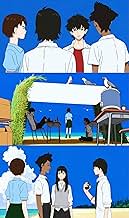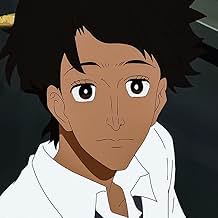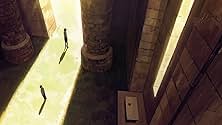Un grupo de estudiantes de vacaciones de verano se ven transportados a otra dimensión y se les otorgan superpoderes para sobrevivir allí.Un grupo de estudiantes de vacaciones de verano se ven transportados a otra dimensión y se les otorgan superpoderes para sobrevivir allí.Un grupo de estudiantes de vacaciones de verano se ven transportados a otra dimensión y se les otorgan superpoderes para sobrevivir allí.
- Premios
- 2 premios ganados y 8 nominaciones en total
Explorar episodios
Opiniones destacadas
I don't know what's happening but ep1 literally hooked me up on this show, it's truly great.
This show so far has not ceased to surprise me, every time after finishing an episode I'm in shock of just how awesome each episode is. The storyline as of august 1st 2021 is going strong there are a few things that don't make sense believe it or not it makes sense that they don't make sense a lot of the time. It just shows that it is absolutely incredible, not just the story but the art too.
It would be pretentious to say, "Sonny Boy isn't for everyone." Sonny Boy is accessible to everyone, but it demands patience and an open mind. If you're willing to solve this puzzle of an anime, the payoff is worth it. Rewatching it, you will notice clever foreshadowing, irony, and metaphors within the complex story and mesmerizing visuals.
Sonny Boy is about an entire class that suddenly shifts into the void-comparable to a sci-fi take on Lord of the Flies. Out of the thirty-six stranded students, a couple dozen of them gain mysterious supernatural abilities. The students clash with each other's values, causing all kinds of interpersonal conflicts. Each argument represents a more significant societal issue. Controversial political topics, including capitalism, totalitarianism, freedom, religion, and authoritarianism, are covered throughout the show. They present these themes objectively. The plot is not straightforward in the slightest. The writers purposefully wove it like a maze. Understanding it requires you to pay close attention. Often I had to rewatch episodes to follow along, pause scenes to process what I saw, or rewind. Understanding fighting a final boss each time-though challenging, the reward is always satisfying. The cycle of confusion, curiosity, and solving the puzzle becomes addictive. Anyone who struggles to understand Sonny Boy is perfectly valid, it is intentionally obtuse, and that's not everyone's cup of tea. Though the complex themes and tangled narrative may lead you to assume the character writing is thin-they are anything but one-dimensional.
Rather than focusing on one point of view, the narrative follows multiple students to explore new themes. Nagara, the self-insert protagonist, is at the center of the plot, as the author has confirmed himself. He is one of, if not the best, self-insert lead characters I've seen in anime. Nagara's journey involves finding a reason to live. His arc is a classic coming-of-age story-beginning as a depressed teenager. Along with his friends, especially an eccentric girl named Nozomi, he transforms into a new person. Nagara's deadpan personality makes their dialogue oddly funny, though you must still pay attention. Each person is utilized as a mouthpiece for the author's philosophical musings. Their conflicts in values allow us to peer into his mind.
The show is as much of a journey of self-discovery for Nagara as it is for the author. The classmates who accompany him, Nozomi, Mizuhara, Rajidani, and Asakaze, undergo character development. Asakaze is the weakest of the bunch because he grows much less than his friends. He began as an average teenage rebel. He lacked the intriguing background and internal strife of the other, much more compelling characters. Nagahara has a monotonous voice, and he is a coward, but we know why. There is depth to him that's not shoved down our throats. Even though his outlook on life is wildly different from his classmates, they share a goal. Find how they get home and who sent them to the new world, and why. That's what makes Sonny Boy's characters so good-they have motivations. Even though we may not necessarily agree with them, it is obvious why they do the things they do.
As the show explains the superpowers and complicated logic of the setting, you will notice character development is seamlessly woven in. We learn about Mizuho's power simultaneously that we know she can create anything she wants. We find Nagara's power when we see him get confronted and anxious, not told through info dumps. The writers treat us like adults. We see characters act out their distinctive personalities then create our judgment. There is one slight exception to this: After the mysteries occur, such as spontaneous blue fires, there will be a follow-up explanation from the most intelligent person in the class: Rajidani. He gathers together the students to lecture them about how their new world works. He does not set rules, unlike the authoritarian student council. He learns as much about reality as possible because his goal is to escape. Rajdhani sticks with the main cast to conduct his intriguing experiments with them. The author develops the multiverse concepts through him: There are days and nights in the alternate world, but the characters do not age or need to change clothes. All of them are permanently stuck as middle schoolers. Through their inability to age, the author pries open the door to eternity; some students find peace, and others futilely attempt to escape their solitude. The anime begins as an inconspicuous middle school drama, moving through group hysteria, personal anguish, then endless lamentation.
Sonny Boy is visual poetry. Every setting could be framed in a museum, whether it be shots of nature or the trippy visualization of the multiverse. The atmosphere flows from whimsical, melancholic to cosmic horror-the director's clever use of hard cuts slicing apart the show like a layered cake. Tonal dissonance would typically be a source of criticism, but it illustrates the group dynamic's fragility. When the characters are framed at a distance, they fade into the background like an oil painting. Their figures quietly morph into shapes rather than human forms. This passion project was helmed by Shingo Natsume, known for directing One Punch Man's first season. Given how good the writing is, I'm shocked to see he has never written anything before now.
The soundtrack is one of the best of the year-with 20 distinctive tracks. Every instrument works together, the basslines are strong throughout, and the talented singers suit the rhythm. The songs build up and have direction, used to guide the show's narrative. Numerous audio effects combine to make the setting feel grounded and realistic. The sound engineers did not use stock sound effects; they expertly recorded the sounds themselves with foley techniques. Although the audio was overbearing at first, they found their groove as the episodes progressed.
Not all is explained in Sonny Boy, but enough is there for vibrant discussion to break out the minute the credits roll at the end of every episode. I've got my theories about all of it, and everyone will walk away from it feeling differently. What's undeniable, though, is the staggering profundity that emerges from a seemingly innocuous experimental anime. This is one we will look back on for years to come.
Sonny Boy is about an entire class that suddenly shifts into the void-comparable to a sci-fi take on Lord of the Flies. Out of the thirty-six stranded students, a couple dozen of them gain mysterious supernatural abilities. The students clash with each other's values, causing all kinds of interpersonal conflicts. Each argument represents a more significant societal issue. Controversial political topics, including capitalism, totalitarianism, freedom, religion, and authoritarianism, are covered throughout the show. They present these themes objectively. The plot is not straightforward in the slightest. The writers purposefully wove it like a maze. Understanding it requires you to pay close attention. Often I had to rewatch episodes to follow along, pause scenes to process what I saw, or rewind. Understanding fighting a final boss each time-though challenging, the reward is always satisfying. The cycle of confusion, curiosity, and solving the puzzle becomes addictive. Anyone who struggles to understand Sonny Boy is perfectly valid, it is intentionally obtuse, and that's not everyone's cup of tea. Though the complex themes and tangled narrative may lead you to assume the character writing is thin-they are anything but one-dimensional.
Rather than focusing on one point of view, the narrative follows multiple students to explore new themes. Nagara, the self-insert protagonist, is at the center of the plot, as the author has confirmed himself. He is one of, if not the best, self-insert lead characters I've seen in anime. Nagara's journey involves finding a reason to live. His arc is a classic coming-of-age story-beginning as a depressed teenager. Along with his friends, especially an eccentric girl named Nozomi, he transforms into a new person. Nagara's deadpan personality makes their dialogue oddly funny, though you must still pay attention. Each person is utilized as a mouthpiece for the author's philosophical musings. Their conflicts in values allow us to peer into his mind.
The show is as much of a journey of self-discovery for Nagara as it is for the author. The classmates who accompany him, Nozomi, Mizuhara, Rajidani, and Asakaze, undergo character development. Asakaze is the weakest of the bunch because he grows much less than his friends. He began as an average teenage rebel. He lacked the intriguing background and internal strife of the other, much more compelling characters. Nagahara has a monotonous voice, and he is a coward, but we know why. There is depth to him that's not shoved down our throats. Even though his outlook on life is wildly different from his classmates, they share a goal. Find how they get home and who sent them to the new world, and why. That's what makes Sonny Boy's characters so good-they have motivations. Even though we may not necessarily agree with them, it is obvious why they do the things they do.
As the show explains the superpowers and complicated logic of the setting, you will notice character development is seamlessly woven in. We learn about Mizuho's power simultaneously that we know she can create anything she wants. We find Nagara's power when we see him get confronted and anxious, not told through info dumps. The writers treat us like adults. We see characters act out their distinctive personalities then create our judgment. There is one slight exception to this: After the mysteries occur, such as spontaneous blue fires, there will be a follow-up explanation from the most intelligent person in the class: Rajidani. He gathers together the students to lecture them about how their new world works. He does not set rules, unlike the authoritarian student council. He learns as much about reality as possible because his goal is to escape. Rajdhani sticks with the main cast to conduct his intriguing experiments with them. The author develops the multiverse concepts through him: There are days and nights in the alternate world, but the characters do not age or need to change clothes. All of them are permanently stuck as middle schoolers. Through their inability to age, the author pries open the door to eternity; some students find peace, and others futilely attempt to escape their solitude. The anime begins as an inconspicuous middle school drama, moving through group hysteria, personal anguish, then endless lamentation.
Sonny Boy is visual poetry. Every setting could be framed in a museum, whether it be shots of nature or the trippy visualization of the multiverse. The atmosphere flows from whimsical, melancholic to cosmic horror-the director's clever use of hard cuts slicing apart the show like a layered cake. Tonal dissonance would typically be a source of criticism, but it illustrates the group dynamic's fragility. When the characters are framed at a distance, they fade into the background like an oil painting. Their figures quietly morph into shapes rather than human forms. This passion project was helmed by Shingo Natsume, known for directing One Punch Man's first season. Given how good the writing is, I'm shocked to see he has never written anything before now.
The soundtrack is one of the best of the year-with 20 distinctive tracks. Every instrument works together, the basslines are strong throughout, and the talented singers suit the rhythm. The songs build up and have direction, used to guide the show's narrative. Numerous audio effects combine to make the setting feel grounded and realistic. The sound engineers did not use stock sound effects; they expertly recorded the sounds themselves with foley techniques. Although the audio was overbearing at first, they found their groove as the episodes progressed.
Not all is explained in Sonny Boy, but enough is there for vibrant discussion to break out the minute the credits roll at the end of every episode. I've got my theories about all of it, and everyone will walk away from it feeling differently. What's undeniable, though, is the staggering profundity that emerges from a seemingly innocuous experimental anime. This is one we will look back on for years to come.
Fairly entertaining and really experimental. It's peaceful to watch and captivating, the characters are amazingly written even though some are not getting enough attention.
The plot is its weakest part against casual viewers looking for something exciting and simple to watch. This show is complex to the point of confusing sometimes, but it stays consistent, entertaining and is simply a really good idea well written and really meaningful.
The animation is spotless and the overall look is refreshing and stunning.
I don't know, I just love it.
The plot is its weakest part against casual viewers looking for something exciting and simple to watch. This show is complex to the point of confusing sometimes, but it stays consistent, entertaining and is simply a really good idea well written and really meaningful.
The animation is spotless and the overall look is refreshing and stunning.
I don't know, I just love it.
I enjoyed it a lot but neigh honest there were some parts that I didn't understand that well but with all the experimentation of the series made me enjoyed it for what it was.
¿Sabías que…?
- TriviaSonny Boy is based on an original story written by director Shingo Natsume who previously had his hand in directing shows such as One Punch Man and Space Dandy.
Selecciones populares
Inicia sesión para calificar y agrega a la lista de videos para obtener recomendaciones personalizadas
- How many seasons does Sonny Boy have?Con tecnología de Alexa
Detalles
Contribuir a esta página
Sugiere una edición o agrega el contenido que falta

Principales brechas de datos
What is the Brazilian Portuguese language plot outline for Sonny Boy (2021)?
Responda




























